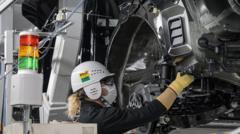In a significant development for the automotive industry, Honda and Nissan have reportedly initiated preliminary discussions regarding a potential merger. The move aims to bolster their competitiveness against electric vehicle (EV) manufacturers, particularly those emerging from China, as both companies seek to navigate the rapidly changing market landscape.
Honda and Nissan Engage in Merger Discussions Amidst EV Market Competition

Honda and Nissan Engage in Merger Discussions Amidst EV Market Competition
Japanese automakers seek collaboration as they face increasing pressure from growing electric vehicle market in China.
Honda and Nissan, Japan's second and third largest car manufacturers respectively, have agreed to explore a strategic partnership focused on electric vehicles since March. Their joint efforts aim to leverage each other's technological strengths and resources amidst intensifying competition in the auto industry, transforming away from traditional petrol and diesel models.
Both companies issued identical statements regarding the exploratory talks, clarifying that while discussions are ongoing, there has been no formal announcement of a merger. "As announced in March of this year, Honda and Nissan are exploring various possibilities for future collaboration, leveraging each other's strengths," they stated.
The potential merger surfaces as OEMs increasingly pivot towards electric mobility. Honda and Nissan have not denied reports originating from Nikkei that they are contemplating a merger, but they also emphasized the discussions are in the early stages, underscoring that no definitive agreement has been reached yet. Stakeholders will be updated accordingly, the companies said.
According to reports from Japanese media, it is expected that both corporations could officially confirm their merger discussions in the coming week. Amidst speculation, Nissan refrained from commenting on Bloomberg's claims that Foxconn, the iPhone maker, has approached to acquire a controlling stake in Nissan, while Foxconn has not provided any comments on the matter.
Market analysts believe that a merger could engender significant challenges. The prospect of job cuts and the dissolution of Nissan's existing partnership with French automaker Renault could attract political scrutiny within Japan. In response to the challenges they face, Honda and Nissan solidified their collaboration in August, focusing on battery technology and upcoming innovations. They also engaged Mitsubishi Motors to explore further partnerships in electrification.
Stock market responses to the merger gossip have been mixed: Nissan's shares surged by over 23%, reflecting optimism among investors, whereas Honda's shares saw a downturn of approximately 3%. Meanwhile, Mitsubishi's shares experienced a boost of nearly 20%.
Industry analysts assert that the increased competition from lower-cost EV models, particularly from Chinese manufacturers like BYD, could inhibit growth for traditional automobile brands. Edmunds analyst Jessica Caldwell noted the difficulties smaller players face in a progressively crowded market.
With nearly 70% of global EV sales originating from China, Honda and Nissan's struggle to capture market share in this landscape illustrates their pressing need for enhanced collaboration. Jesper Koll, an analyst with Monex Group, cautioned that without innovative technologies or compelling products, a merger might not suffice in redefining the competitive landscape for either brand.
Ultimately, as the discussions on a potential merger continue, the future remains uncertain for both Japanese automakers in the evolving global market for electric vehicles.
Both companies issued identical statements regarding the exploratory talks, clarifying that while discussions are ongoing, there has been no formal announcement of a merger. "As announced in March of this year, Honda and Nissan are exploring various possibilities for future collaboration, leveraging each other's strengths," they stated.
The potential merger surfaces as OEMs increasingly pivot towards electric mobility. Honda and Nissan have not denied reports originating from Nikkei that they are contemplating a merger, but they also emphasized the discussions are in the early stages, underscoring that no definitive agreement has been reached yet. Stakeholders will be updated accordingly, the companies said.
According to reports from Japanese media, it is expected that both corporations could officially confirm their merger discussions in the coming week. Amidst speculation, Nissan refrained from commenting on Bloomberg's claims that Foxconn, the iPhone maker, has approached to acquire a controlling stake in Nissan, while Foxconn has not provided any comments on the matter.
Market analysts believe that a merger could engender significant challenges. The prospect of job cuts and the dissolution of Nissan's existing partnership with French automaker Renault could attract political scrutiny within Japan. In response to the challenges they face, Honda and Nissan solidified their collaboration in August, focusing on battery technology and upcoming innovations. They also engaged Mitsubishi Motors to explore further partnerships in electrification.
Stock market responses to the merger gossip have been mixed: Nissan's shares surged by over 23%, reflecting optimism among investors, whereas Honda's shares saw a downturn of approximately 3%. Meanwhile, Mitsubishi's shares experienced a boost of nearly 20%.
Industry analysts assert that the increased competition from lower-cost EV models, particularly from Chinese manufacturers like BYD, could inhibit growth for traditional automobile brands. Edmunds analyst Jessica Caldwell noted the difficulties smaller players face in a progressively crowded market.
With nearly 70% of global EV sales originating from China, Honda and Nissan's struggle to capture market share in this landscape illustrates their pressing need for enhanced collaboration. Jesper Koll, an analyst with Monex Group, cautioned that without innovative technologies or compelling products, a merger might not suffice in redefining the competitive landscape for either brand.
Ultimately, as the discussions on a potential merger continue, the future remains uncertain for both Japanese automakers in the evolving global market for electric vehicles.





















